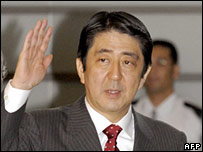Analysis
 |
ABE'S ELECTORAL DISASTER - WHAT NEXT IN JAPANESE POLITICS?by Purnendra Jain purnendra.jain@adelaide.edu.au Professor and Head, Centre for Asian Studies, Adelaide University |
| Japan’s ruling Liberal Democratic Party (LDP) got trounced at the triennial House of Councillors elections held on 29 July. The LDP is for the first time reduced to a minority status in the upper house of Japan’s bicameral parliament, while opposition parties, led by the Democratic Party of Japan (DPJ) have gained majority. Former LDP heavyweight Ichiro Ozawa’s DPJ has already occupied the House of Councillors chair and will head most of the important committees, thus controlling parliamentary business in this house. This will frustrate the government in passing bills even though it still holds a solid majority in the House of Representatives, the lower house. Prime Minister Abe has hitherto resisted the pressure to resign, as he still has support from some senior party colleagues. Technically, the prime minister need not resign as he is the leader of the House of Representatives, the more powerful lower house, where the LDP together with its coalition partner, New Komeito, maintains a two thirds majority. Precedents, however, do suggest that the prime minister should take responsibility and offer resignation even after an upper house electoral debacle, as happened in 1989 and 1998. But despite demand from the opposition and even within his own party Abe refuses to step aside. Instead he has vowed to reshuffle his cabinet soon and appoint new party officials in order to inject fresh life in his party and government. How long Abe will continue in his position is hard to tell. |
What is certain is that he has lost his previous influence both within his party and government. Abe stays for the moment partly because the LDP has no clear succession plan and in times of political volatility and falling popularity no one is willing to put their hand up to challenge Abe. Voters’ thumbs down to the LDP indicate that they feel increasingly concerned about the prevailing corrupt practices, such as financial misappropriations by ministers, and bureaucratic bungles like the disappearance of pension records of around half of the Japanese working population. When he took office in September last year, Abe was seen as a new breed of political leader befitting the 21st century. But he disappointed many in Japan through his inaction and lip service when political corruption and official mismanagement surfaced. Nor was he able to address increasing economic disparities and the rural-urban divide.
|
Instead, he focused on his nationalist agenda through educational reform and constitutional revision – issues that remain highly divisive. Soon he was seen to be an old-style LDP leader courting support from vested interests rather than moving forward with a reformist agenda. Whether or not Abe continues, the LDP’s position within Japanese politics has weakened considerably. The party that has ruled Japan for 51 of the past 52 years may face greater electoral competition at the next lower house elections in 2009. If Ozawa and his team continue to offer attractive and competitive policy choices to voters without falling apart as other opposition parties have done in the past, they could be writing a new chapter in Japanese politics: the eventual arrival of a two-party system. Links:
|

 |
MAINSTREAMING GENDER IN WATER RESOURCE MANAGEMENT IN SOUTHEAST ASIA AND THE PACIFIC (SEAP): LESSONS FOR AUSTRALIAby Kuntala Lahiri-Dutt kuntala.lahiri-dutt@anu.edu.au, Fellow at the Resource Management in Asia Pacific Program in the Australian National University, and recently elected member of the global Gender and Water Alliance Steering Committee. |
| The second World Water Forum in The Hague in 2000 noted that water resource management should be based on a participatory approach, with men and women having an equal voice in the use of water and in sharing the benefits. Consequently, the Gender and Water Alliance (GWA) was established as an international advocacy body to strengthen the role of women in water policy and management at all levels. The GWA has become an effective global voice, which champions the idea of integrated water resources management or IWRM. IWRM aims to optimise economic and social welfare without compromising the sustainability of environmental systems. International organisations and many governments have committed themselves to its key principles to guide their policy making. These include:
A Regional Workshop on Strategic Planning for Mainstreaming
Gender in IWRM in Southeast Asia and the Pacific took place in Bangkok
in July 2007. Taking stock of initiatives to integrate gender in water
resource management, the workshop identified a range of activities from
capacity building for small-scale water service providers and |
women farmers in villages and strengthening gender mainstreaming in the Mekong River Commission, to knowledge development, management, and strengthening the GWA as a regional network. It also noted that efforts in gender mainstreaming have so far been aimed at developing countries of the world. This is probably a reflection of the continuing predominance of basic issues of water, sanitation and hygiene in the developing world. While such concerns are not as relevant to developed countries, they could learn from the work being done on gender mainstreaming. Indeed, a close examination of the national water policies and various water-related initiatives within these countries would reveal a poor recognition of women’s concerns. The work taking place in the Southeast Asia and the Pacific gives a cue for what needs to be done in Australia to:
|
Links:
|

Profile
|
This month we profile retired Major General
Michael G. Smith AO, chief executive officer of the humanitarian
aid and development organisation Austcare. |
||
|
Q: What are your current preoccupations?
|
Q: How
do these fit into the contemporary scene? Q: What are your hopes for Asian studies in
Australia? Links:
|
|

Student of the month
|
Hannah Derwent (hannahderwent@yahoo.com.au) always thought that when she went to high school she would study French. However, after starting learning Indonesian, she loved it, and French got the flick. After visiting Indonesia in 1996 on a school trip, Hannah couldn’t wait to go back. She continued her Indonesian studies at the University of New South Wales as part of her Bachelor of Arts/Laws, |
and supplemented her course with a semester in Yogyakarta in 2002 as part of the Australian Consortium of In-Country Indonesian Studies (ACICIS) exchange program. Hannah returned to Indonesia in 2004 and travelled throughout Java and Sulawesi. On finishing university in June 2005, she worked in Sydney in the field of immigration law where she dealt with clients from all different cultural backgrounds. In January 2006, Hannah moved to Aceh. She lived in Aceh Pidie for a couple of months while doing part-time translation work for the International Development Law Organization (IDLO) in Banda Aceh. When IDLO opened their office in Banda Aceh in March 2006, Hannah began working there as Project Assistant, and was promoted to Legal Officer in September 2006. Hannah is currently managing three of IDLO’s programs, as part of their Post-Tsunami Legal Assistance Initiative, assisting tsunami survivors with their legal needs, in particular land, inheritance and guardianship issues. Hannah has found her Indonesian language skills and understanding of the Indonesian context incredibly valuable in Aceh, making liaising with local partners and government agencies so much easier. The work Hannah has done with IDLO has also vastly increased her knowledge of Islamic law and how it is applied in Aceh, and in Indonesia generally. Hannah implores people not to underestimate the opportunities that are out there for people with solid Asian language skills, especially in Indonesia! Links: International Development Law Organization http://www.idlo.i
|

Website of the month
|
The China Economic Databases project is sponsored by the Center for China Studies in National Chengchi University and supported by the Ministry of Education in Taiwan. This site has nine databases: Books; Literature Index; Policy Reports; Economic Reports; OpenCourseWare; Conferences; Websites; Experts; Call for papers ; RMB Research. |
Recent article of interest
|
See also Lowy Institute Executive Director Allan Gyngell’s
policy brief Design faults: the Asia Pacific’s regional
architecture http://www.lowyinstitute.org/, |

Did you know?
| The Winston
Churchill Memorial Trust recently awarded 117 fellowships. For the first
time, one of these was sponsored by the Australia-China Council. Ms
Amanda Phillips, a dancer, director, actor, choreographer and educator
from Adelaide won the 2007 fellowship worth $22,000. Her project is
to identify strategies for implementing cultural education and learning
of the arts through inclusive systems for dance in Asia. See http://www.dfat.gov.au/acc/
|

Diary dates
|
AUSTRALIA'S FREE TRADE AGREEMENT WITH THE PEOPLE'S
REPUBLIC OF CHINA, 22 August, Sydney. Graeme Meehan, deputy
head of the China Free Trade Agreement Task Force, Department of Foreign
Affairs and Trade, will deliver a progress report on the negotiations
at the University of Technology Sydney’s China Research Centre
at 7pm. RSVP by 20 August to http://surveys.uts.edu.au/index.cfm?surveyid=2910 FIVE MINUTES TO MIDNIGHT - Climate Change with Dr Peter Christoff and Dr Graeme Pearman, 23 August, Melbourne. Dr Peter Christoff coordinates Environmental Studies in the School of Social and Environmental Enquiry, University of Melbourne and Dr Graeme Pearman was Chief of CSIRO Atmospheric Research from 1992-2002. This event will examine the realities of climate change and how to find equitable solutions for Australia and the region. It will be chaired by Professor Ross Garnaut, who has been commissioned by the Labor Party to study the economic impact of climate change. Thursday 23rd August 2007, 6.30 pm - 8.00 pm Carrillo Gantner Lecture Theatre, Sidney Myer Asia Centre, University of Melbourne To reserve a seat, please send an email to events@asialink.unimelb.edu.au
with "Climate Change" in the subject line. RELIEF IN SIGHT? How well prepared is Australia
to respond to a crisis in our region? 23 August, Adelaide. This
forum will look at what capacity Australia has to bring about immediate
and effective relief when a crisis hits in the region? It is presented
by World Vision Australia and AusAID and supported by The Bob Hawke
Prime Ministerial Centre. Speakers include the Minister for Foreign
Affairs, Alexander Downer, CEO of the Australian Red Cross, Robert Tickner
and Strategic Operations Director in World Vision International, Dan
Kelly. 5.15pm for 5.30pm start: Sebel Playford Adelaide To register
go to: http://www.unisa.edu.au/hawkecentre/ NATURE THROUGH JADE, international symposium, 1 September 2007, Sydney. This symposium will be held in conjunction with the exhibition Translucent world: Chinese jade from the Forbidden City at the Art Gallery of New South Wales 29 August–11 November 2007. Speakers include: Li LIU, La Trobe University; J Keith Wilson, Freer Gallery of Art and Arthur M Sackler Gallery; Jenny So, Chinese University of Hong Kong; ZHANG Rong, Palace Museum, Beijing; LIU Yang, Art Gallery of New South Wales; ZHANG Guangwen, Palace Museum, Beijing. 9.30am - 4.30pm. Bookings: Tel: (02) 9225 1878. See www.artgallery.nsw.gov.au/member/events
APEC ECONOMIC LEADERS MEETING, 8-9 September, Sydney. The main event of the APEC year brings together the 21 APEC Member Economy leaders, thousands of delegates, support personnel and the international media. See http://www.apec2007.org INTELLIGENCE ANALYSIS IN THE ASIA-PACIFIC: INTELLIGENCE CULTURE AND PRACTICE The Australian Institute of International Affairs South Australian Branch is hosting this conference on 17 and 18 September at the University of Adelaide. Contact: Associate Professor Felix Patrikeeff felix.patrikeeff@adelaide.edu.au SOUTH ASIA UPDATE AND POVERTY DYNAMICS CONFERENCE,
27 and 28 September 2007, Canberra. This discussion of issues
and events in India and South Asia aims to enhance policy makers’
knowledge of trends and developments in South Asia, and to provide networking
opportunities for exploring economic, social and political dynamics
in the region. Speakers include renowned experts from the World Bank,
the Asian Development Bank, the Australian Strategic Policy Institute
and regional agencies as well as specialists based in Australian and
overseas universities. For further information contact Tracy Lee t.lee@latrobe.edu.au
or visit the conference website: www.sueztosuva.org.au/south_asia/sa_research_facility.php
CHINA: CONFERENCE ON MIGRATION AND SOCIAL PROTECTION, 25 to 26 September, Beijing. Monash University's Asian Business and Economics Research Unit together with the Institute of Population and Labour Economics at the Chinese Academy of Social Sciences and the Renmin-Monash Advanced Centre for Economic Studies are staging an international conference to explore issues such as: labour market integration and social protection, migrant participation in social security schemes, migrant alternatives to state-sponsored social protection, migrant working conditions, salaries and wage arrears, and responsibilities of government in the provision of social protection. See www.buseco.monash.edu.au/units/aberu/Conference2007/index.php or contact Dr Ingrid Nielsen Ingrid.Nielsen@buseco.monash.edu.au |
DESPOTS, DEMOCRATS
AND DISCONTENTS: Democratic Prospects and International Policy Responses
in the Middle East and South Asia, 2 October Sydney. The Sydney
Democracy Forum and the Lowy Institute for International Policy are
hosting this event, with the following speakers: Anthony Bubalo (Lowy
Institute for International Policy), Professor Niraja Gopal Jayal (Jawaharlal
Nehru University) and Professor John Keane (Westminster University/University
of Sydney) RSVP: r.mueller@econ.usyd.edu.au by 25 September. SIXTY YEARS OF INDIAN DEMOCRACY: Achievements and Prospects 2 October, Sydney. The Sydney Democracy Forum, with Sydney Ideas, presents a lecture by Professor Niraja Gopal Jayal (Jawaharlal Nehru University) at the Seymour Centre, corner of City Road and Cleveland Street, University of Sydney, 7pm. Bookings are essential: phone (02) 9351 7940. ASPIRE: WATER AND SANITATION IN THE ASIA-PACIFIC
REGION: Opportunities, Challenges and Technology, Perth, 28 October
- 1 November 2007. The Australian Water Association, in conjunction
with the International Water Association is organising this conference,
which will focus on design, operation, maintenance and management of
water and wastewater systems. Innovations in the field, case studies
on safe and reliable systems for removal of nutrients, water reuse,
and methods of better operation will also be discussed at the conference.
There will be specific emphasis on issues facing the Asia-Pacific Region.
Perth Convention & Exhibition Centre. See http://www.awa.asn.au/AM/Template.cfm?Section=ASPIRE_ ASIA PACIFIC REGION: SOCIETIES IN TRANSFORMATION
conference, Georgetown (Penang) Malaysia, 19-22 November, 2007. The
region is seemingly now more integrated, with unprecedented levels of
tourism, migration, and economic and cultural linkages. But, are the
nations of the region, and their populations, more divided, united or
are they fundamentally unchanged over the past two decades? These are
questions to be raised in a conference co-sponsored by the School of
Social Sciences, Universiti Sains Malaysia (USM) and the Centre for
Asia Pacific Social Transformation Studies (CAPSTRANS), University of
Wollongong, Australia The conference website link is at: 17th NEW ZEALAND ASIAN STUDIES SOCIETY (NZASIA) CONFERENCE, Otago, 22-25 November 2007. This will be an open, multidisciplinary conference. Participants are invited to submit panel or paper proposals presenting original research on any Asian-related topic. Proposals for panels are welcome. Paper abstracts, single-spaced and no longer than 200 words, must be submitted before 1 June 2007 to nzasia.conference@stonebow.otago.ac.nz Full conference details can be found at http://www.nzasia.org.nz 'OCCUPYING 'THE OTHER': AUSTRALIA AND MILITARY OCCUPATIONS FROM JAPAN TO IRAQ'. 29-30 November 2007, Wollongong. Call for Papers This symposium sponsored by the Japan Foundation, the Centre for Asia Pacific Social Transformation Studies (CAPSTRANS) at the University of Wollongong and Monash University aims to bring together journalists, public commentators and scholars investigating Australian involvement in foreign military occupations. It will pose the question: ‘How are we to understand this ongoing military commitment to the region, and how can the occupation of Japan contribute to understanding this commitment and, more generically, the role of military occupations today?’ Deadline for the submission of paper is 31 July 2007. Contact Dr Christine de Matos cdm@uow.edu.au IS THIS THE ASIAN CENTURY? 17th Asian Studies
Association of Australia Conference, 1-3 July 2008, Melbourne.
The biennial Asian Studies Association of Australia conference is the
largest gathering of expertise on Asia in the southern hemisphere. The
theme for 2008 invites you to assess how the regions and issues on which
you are interested are faring. The ASAA conference is multi-disciplinary
and covers Central, South, South-East and North East Asia and the relationship
of all of these with the rest of the world. See http://www.conferenceworks.net.au/asaa
|

You are welcome to advertise Asia-related events in this space. Send details to: fbeddie@infinite.net.au
Feedback
What would be useful for you? Human interest stories, profiles of successful graduates of Asian studies, more news about what's on, moderated discussions on topical issues? Send your ideas to fbeddie@ozemail.com.au.
About the ASAA
The Asian Studies Association of Australia (ASAA) promotes
the study of Asian languages, societies, cultures, and politics in Australia,
supports teaching and research in Asian studies and works towards an understanding
of Asia in the community at large. It publishes the Asian Studies Review
journal and holds a biennial conference. ASAA and the Centre for Language
Studies at National University of Singapore also co-publish an annual supplementary
issue of the Centre's fully peer-reviewed electronic Foreign Language Teaching
Journal (e-FLT). See http://e-flt.nus.edu.sg
The ASAA believes there is an urgent need to develop a strategy to preserve,
renew and extend Australian expertise about Asia. It has called on the government
to show national leadership in the promotion of Australia’s Asia knowledge
and skills. See Maximizing Australia's Asia Knowledge Repositioning and
Renewal of a National Asset http://coombs.anu.edu.au/SpecialProj/ASAA/asia-knowledge-book-v70.pdf
Asian Currents is published by the Asian Studies Association of Australia (ASAA) http://coombs.anu.edu.au/ASAA/ thanks to a grant from the International Centre of Excellence for Asia Pacific Studies (ICEAPS) http://iceaps.anu.edu.au. It is edited by Francesca Beddie. The editorial board consists of Robert Cribb, ASAA President; Michele Ford, ASAA Secretary; Mina Roces, ASAA Publications officer; Lenore Lyons, ASAA Council member; and Ann Kumar, Director, ICEAPS.


 Q:
When did you become interested in studying Asia and why?
Q:
When did you become interested in studying Asia and why? 
 The
Minister for Foreign Affairs, Alexander Downer, delivered a speech
to the Australian Institute of International Affairs and Australian
Chamber of Commerce & Industry International Business Conference
in Western Australia on 27 July in which he talked about APEC’s
role in Asia Pacific Regionalism. Downer outlined his views on liberal
trade regimes, APEC’s achievements since 1989 and the issues
facing the Leaders’ Meeting to be held in Sydney in September,
including further trade, investment and domestic economic liberalisation;
and the region’s energy needs and climate change. He made it
clear there was no mood in APEC for expanding membership to allow
India’s entry into APEC.
The
Minister for Foreign Affairs, Alexander Downer, delivered a speech
to the Australian Institute of International Affairs and Australian
Chamber of Commerce & Industry International Business Conference
in Western Australia on 27 July in which he talked about APEC’s
role in Asia Pacific Regionalism. Downer outlined his views on liberal
trade regimes, APEC’s achievements since 1989 and the issues
facing the Leaders’ Meeting to be held in Sydney in September,
including further trade, investment and domestic economic liberalisation;
and the region’s energy needs and climate change. He made it
clear there was no mood in APEC for expanding membership to allow
India’s entry into APEC.